Mobile gadgets have become an essential part of our everyday routine. As per data, the worldwide tally of mobile device users stands at 5.13 billion, constituting 65% of the global population. Given this substantial user base, businesses engage in fierce competition to achieve maximum customer satisfaction and garner more users for their digital offerings, be it web applications or mobile applications. But which choice holds greater advantages in pursuit of this objective?
Let’s overview an analysis and comparison of mobile applications and websites, dive deeper into the merits and demerits of both solutions, and ascertain which option proves more lucrative for your business.
Difference Between App and Website
Let’s begin with notions and concepts of both digital products:
A mobile website is a row of interrelated web pages accessed through the browser. Its UI design, elements layout, and interface parts adjust to the gadget it is used on.
Their main peculiarities are the following:
- Mobile websites’ general primary purpose is to display content that doesn’t require lots of interaction
- Another distinctive characteristic of such solutions is the need for the Internet connection to access and operate the web page
- Within the development investments, websites are more cost-efficient and have a lower price in comparison with applications
In contrast with websites, mobile applications are built for a specific platform (iOS/Android). Their characteristics are listed below:
- The usage of mobile apps requires their downloading from the market depending on your operating system (OS). As a result, they can be run offline
- It can make use of native features of the mobile gadget
- In addition, such software is faster due to the fact that the data is stored locally on a mobile gadget, on the contrary to websites that commonly use web servers
- Applications require more user interaction
In the further analysis, we’ll define that the prevalent number of cases mobile apps tend to bring more benefits. Nevertheless, it’s vital to mention that popular companies develop both websites with a brilliant design and mobile applications with expanded functionality and opportunities. Thus, they advance their businesses much faster and reach their goals efficiently.
Benefits of Mobile Websites for Business
Before delving into the benefits of web platforms for businesses, it is important to rewind approximately 5-6 years to a time when websites were regarded as the ultimate pathway to achieving business success. Additionally, the ongoing process of digitalization continues to witness a yearly upsurge in Internet mobile traffic. Nowadays, users exhibit a growing preference for mobile devices over traditional laptops. In fact, as of 2020, global mobile traffic accounted for 52% of the total, and this percentage continues to steadily rise. Consequently, entrepreneurs have been actively developing optimized web solutions, some of which can serve as excellent alternatives to native mobile applications.
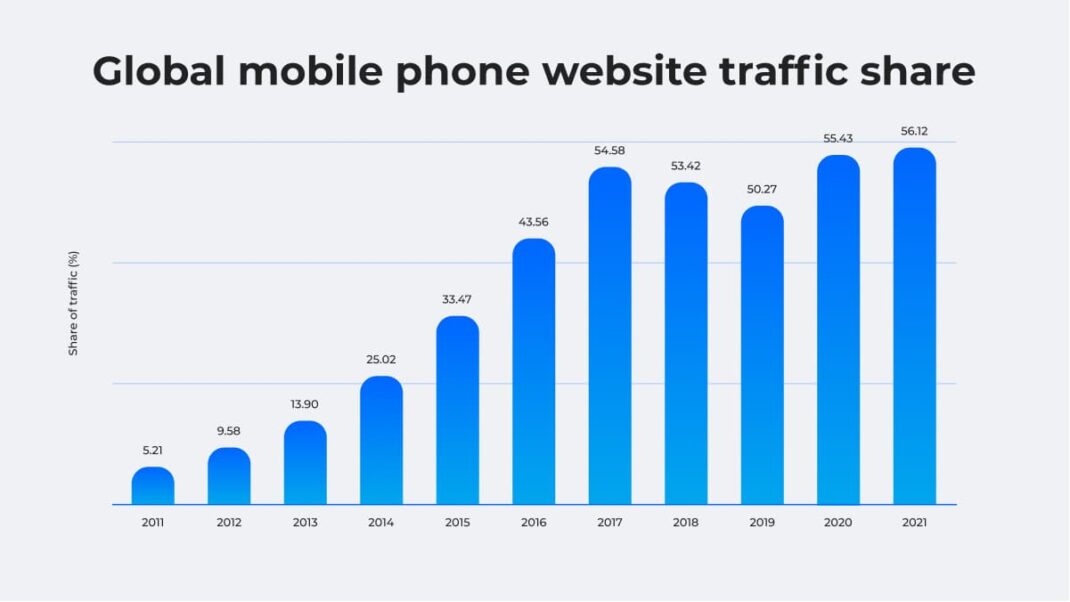
Mobile-adapted websites creation offers two approaches:
- Responsive. In a nutshell, such websites adjust to all screen sizes and look remarkable on every device. The great benefit of such an approach is its cost-efficiency since it requires only a single website codebase and design.
- Adaptive. Its interface elements are rigid and unchanging, which limits their compatibility with only certain screen sizes. Consequently, the website identifies the user’s device upon entry and presents a layout tailored specifically to that particular gadget. This aspect has a notable impact on the cost associated with this approach, as it necessitates the creation of distinct designs for each screen device, resulting in increased investments.
At this point, it can be concluded what the concept of mobile-friendliness comprises. It’s time to consider websites’ benefits more precisely:
Compatibility
Each prosperous software application must possess compatibility, enabling the accessibility and utilization of your website across various devices and platforms. In contrast, when dealing with mobile applications, the need arises to engage app developers for recruitment and establish distinct teams for crafting an app tailored to each platform. Consequently, web development extends its reach to a wider audience while maintaining cost efficiency.
Apart from the fact that websites cover a bigger audience and help increase traffic to your website and make more sales, they don’t require installation for usage. So it is more convenient, as they don’t take so much space in the storage. They can be easily found in the browser and instantly operated with no searching and downloading.
Updates
An additional noteworthy advantage of websites lies in the streamlined process of updating them. Websites become instantly accessible once their latest versions are uploaded to the servers, resulting in substantial time savings. In contrast, the updating of apps is notably more intricate. Depending on the platform, the updated app version necessitates verification from either Google or Apple. This verification process typically spans a maximum of two days when using the App Store and approximately two hours when utilizing Google Play.
Search Engine Optimization
SEO optimization is another advantageous peculiarity of web platforms. By applying ways to search engine optimize your content, you can make a web platform generate more leads and turn them into your devoted customers. When typing in a specific request and looking through the search results, potential customers will find and enter your website regularly in case of its proper optimization. Therefore, the target audience will discover your website more often, expanding your client base.
When it comes to mobile applications, users usually look for them in marketplaces. Therefore, their high rating from users is the only way to lift them up in the ranking of search engines.
Cost-Efficiency
As previously mentioned, the reduced development expenses are attributed to the fact that websites can be accessed on any device through web browsers and are built with a unified codebase. This eliminates the necessity of creating distinct products for various operating systems, a requirement often encountered in the development of applications due to each platform having its unique architectural intricacies and development principles.
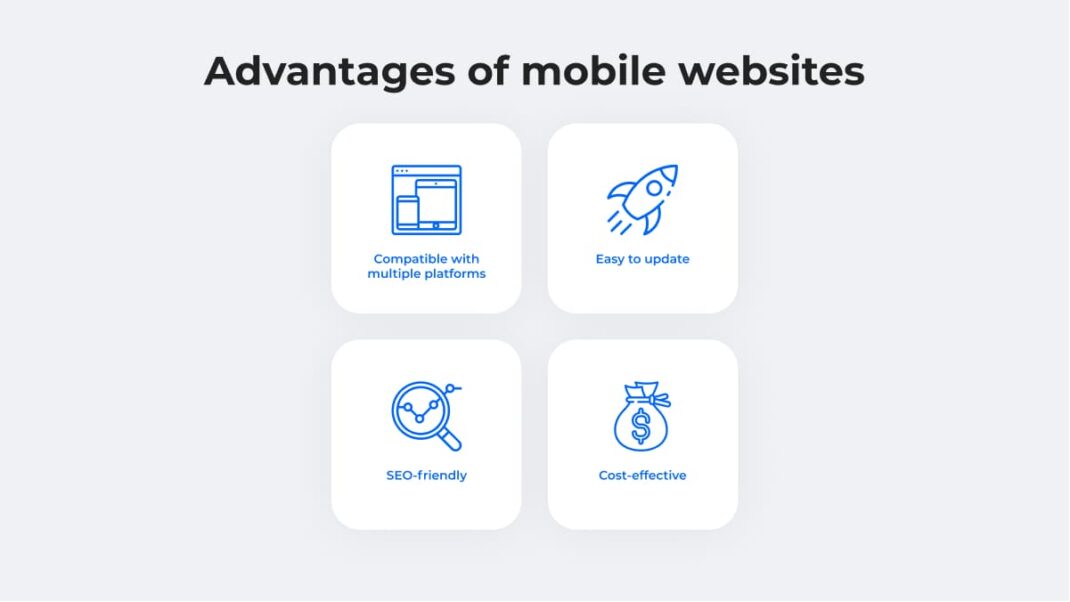
Challanges You May Face With While Working on Mobile Websites
Now let’s list flaws of website development for business, as they are also highly important and worth mentioning:
Absence of offline access
In contrast to mobile applications, websites lack offline functionality. Web platforms can solely exhibit previously cached pages and content, but they do not offer interactivity or operability without an active internet connection. This is because any user action necessitates the transmission and processing of queries through the internet.
Platform drawbacks
Mobile applications can use native features of the device’s OS, which is unavailable for websites. This fact can certainly affect the stability of the web platform’s operation and limit its features, opportunities, and capabilities.
Besides, you should note that each platform comprises a specific functionality. This means that website features available for iOS can be inaccessible for Android and vice versa.
Here are some of such confines:
Significant limitations on iOS:
- Inaccessible push notifications
- Unavailable Siri integration
- Restriction of ARKit, Face ID, Touch ID, Bluetooth, and battery data
Vital drawbacks on Android:
- Inaccessible calendar;
- Confined communication features, like calls and messages
Yet, GPS, camera, and some more features allowing to extend the product’s functionality and capabilities are available for mobile websites via a row of APIs and libraries.
User Experience (UX)
Mobile websites operate within the browser, which brings certain technical obstacles and results in a poor user experience. Applications for mobile gadgets are architected for a particular platform covering its peculiarities and screen size. Such an individual approach to product development satisfies users more efficiently.
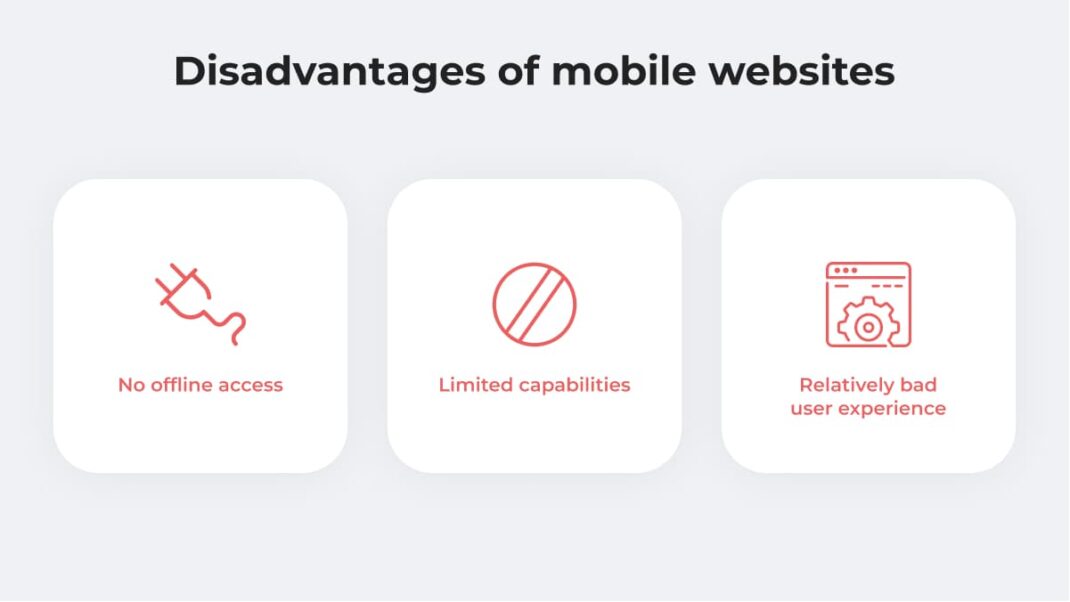
Advantages of Mobile Apps for Business
To demonstrate the extensive utilization and effectiveness of mobile applications, let’s examine certain statistics. For instance, during the second quarter of 2020, the typical American individual devoted three hours daily to their smartphone, marking a 10% increase compared to the first quarter. Additionally, it is projected that mobile apps will generate approximately $935 billion by the year 2023.
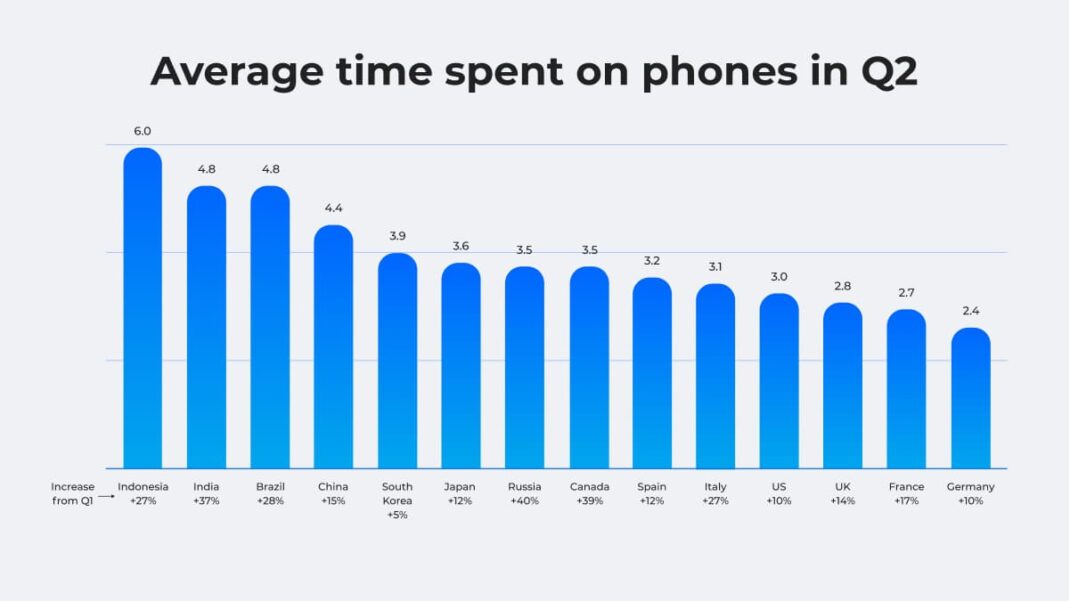
According to the statistics mentioned above, it may be indicated that businesses which stick to a mobile strategy are more likely to expand, progress, attract a broader audience, and make more profit.
Extensive Capabilities
By involving native platform’s features, mobile applications contain more extended capabilities rather than websites. Thus, app development is a way to create a sophisticated and complex product. Especially if your software requires capabilities of native functionality (for example, accelerometers), building an app for business is a beneficial option for you.
User Experience
Seamless navigation, native UI components, smooth operation, and features created for a specific OS deliver an excellent user experience. As a result, the usage of an application will be more efficient and pleasant in comparison with websites.
Offline Access
The app installed on a mobile device is available even with no Internet connection, making it more useful and efficient for the audience. If your software or its particular functionality elements require offline access, then website development won’t suit your case.
Brand Promotion Opportunities
The application can function as a promotional tool for your business. Users frequently access their home screens throughout the day, where they encounter your brand’s icon. This allows you to maintain a connection with your audience and reinforce their awareness of your company and its offerings. Furthermore, applications that incorporate push notifications can keep customers informed about exclusive deals and discounts, offering a more personalized experience. Prominent industry leaders like Coca-Cola and IKEA have already harnessed this potential by leveraging augmented reality-based apps.
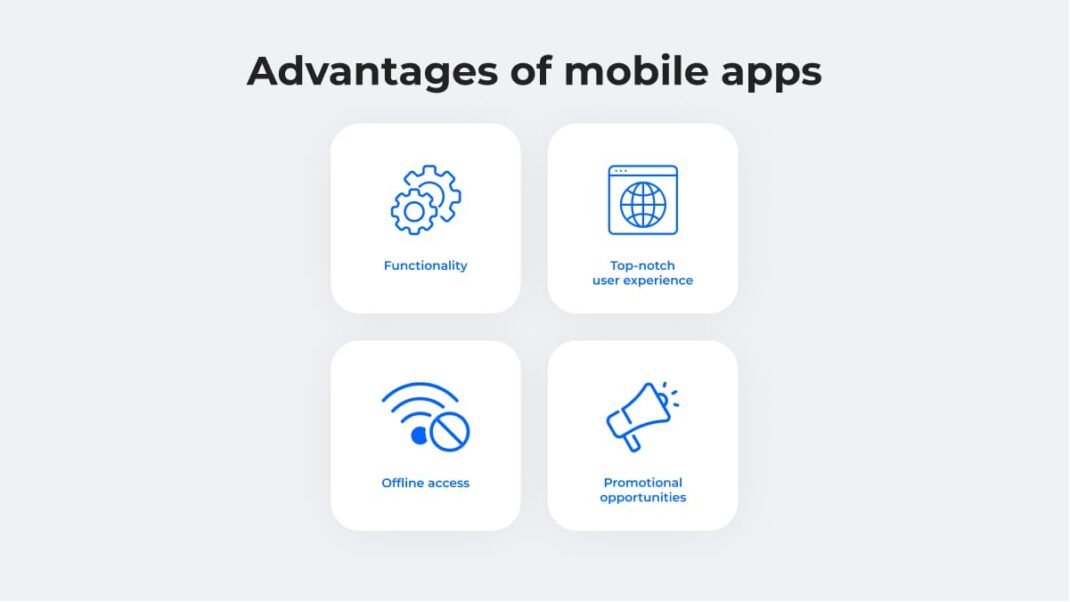
Issues of Mobile Apps
App creation has a row of negative points, let’s discuss them.
Higher cost
A primary requirement for app development is a considerable budget, as you’ll have to make substantial financial investments in this process. Native app creation limits your audience according to the platforms it’s built for. Covering both OSs involves two teams of iOS and Android developers.
On the other hand, brand-new technologies offer a solution to this issue, which is Flutter.
It allows creating cross-platform software by developing a single codebase and applying it to both OSs.
Maintenance & upgrade
Mobile apps require constant support and updating to stay sought-after. Like with any other digital product, upgraded versions should comprise updated features and functionality and the lack of bugs. Moreover, mobile app support and maintenance services yearly cost from 20% to 50% of the initial app cost. Meanwhile, websites don‘t require that much effort and expenses in terms of maintenance as they can be run on both platforms through a browser.
Difficulties of approval
Irrespective of the selected platform, introducing an app to the market involves a multifaceted and time-consuming procedure. For example, when launching an iOS application, it is imperative to ensure that your software adheres to the App Store Review Guidelines, as it will undergo thorough scrutiny before becoming available to the public. The estimated timeframe for receiving a verdict is approximately four days. If your product is free from defects and adheres to all essential guidelines, it will be made accessible on the App Store.
The process of launching Android software involves numerous intricacies. The app verification process also entails adhering to a series of compliance measures and typically spans a duration of at least 7 days, if not longer. What sets Google Play apart is that if your app is rejected, experts will provide specific reasons for rejection, allowing you to address and successfully complete the verification process. In contrast, with iOS, you won’t receive detailed feedback regarding the cause of rejection.
When creating a mobile-friendly website, there’s no requirement to await approval from a marketplace.
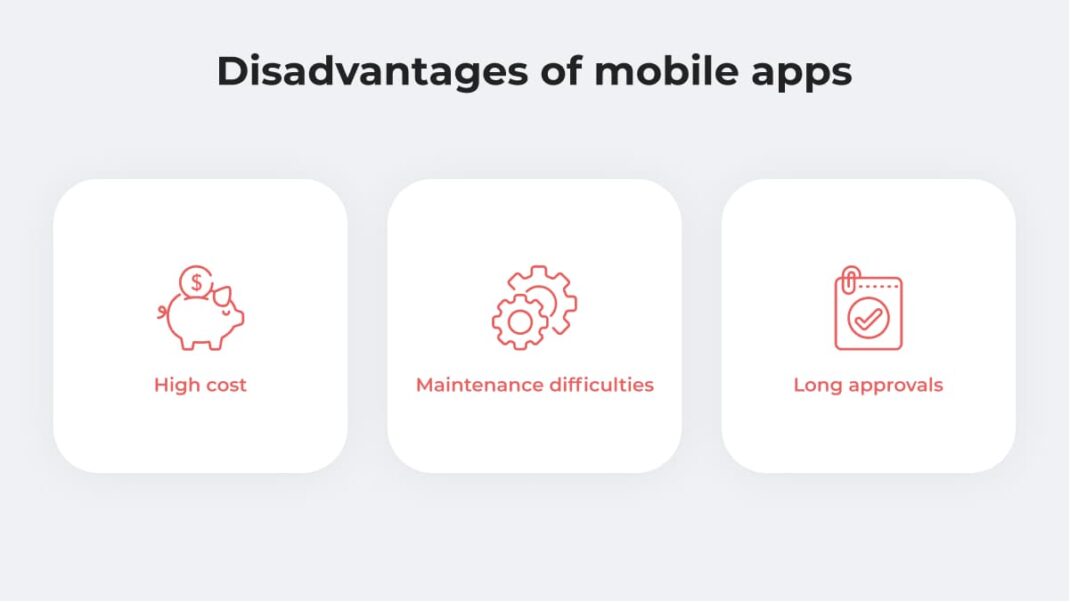
Mobile App vs. Mobile Website
To conclude the analysis we’ve made above, let’s observe a table covering the benefits and drawbacks of each solution according to various indicators.
| Criteria | Mobile app | Mobile-friendly website |
| User experience | Excellent performance, applying native device’s features, convenience | Limited by the need to account for all gadgets |
| Customization | Extended opportunities (push notifications, various settings, widgets, etc.) | Offers limited functionality and capabilities |
| Offline usage | App data can be stored on the gadget, works efficiently with no Internet connection | Only cache pages content with no possible interaction |
| Compatibility | Diverse versions for separate platforms require individual development and maintenance approaches | One platform supporting all devices accessed via the browser |
| Reach | Covers only users of the platform the app is created for | Accessible for everyone with the Internet connection |
| Cost | High building, support, and updating cost | Lower creation and maintenance cost |
Summarizing
The decision between developing a mobile application or crafting a website depends entirely on your specific situation, financial resources, and the objectives you aim to achieve for your business. The selected approach will determine the extent of your user base and the intricacy of functionalities and opportunities you can offer them.
Both mobile apps and websites necessitate the involvement of a skilled team of experts who will align with your needs and identify the features that will enhance your brand. Therefore, to produce a high-quality product that will prove beneficial to numerous users, it is advisable to seek the services of a software development company with a proven track record in a diverse array of domains, particularly the one pertinent to your industry.
